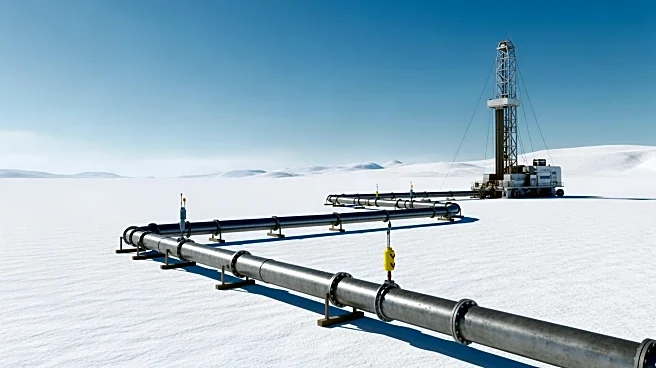What's Happening?
Glenfarne Alaska LNG, LLC and Baker Hughes have announced a strategic alliance to advance the Alaska LNG Project. The partnership involves Baker Hughes supplying main refrigerant compressors for the LNG terminal
and power generation equipment for the North Slope gas treatment plant. The announcement was made during a ceremony in Washington, D.C., attended by Secretary of the Interior Doug Burgum and Secretary of Energy Chris Wright. The project is seen as a significant step towards enhancing U.S. energy security and independence, with Glenfarne developing the project in two phases. Phase One includes an 807-mile pipeline to transport natural gas from Alaska’s North Slope, while Phase Two will add the LNG terminal to enable 20 million tonnes per annum of LNG export capability.
Why It's Important?
The Alaska LNG Project is poised to be one of the most significant energy infrastructure projects in U.S. history, potentially bolstering energy security for America and its allies. The strategic alliance with Baker Hughes reflects the project's momentum and ability to attract global partners, which is crucial for achieving national and state energy objectives. The project supports U.S. leadership in reliable, responsible, and affordable energy, contributing to energy independence and global competitiveness. The development of this project could have substantial economic benefits for Alaska and the broader U.S. energy sector.
What's Next?
Glenfarne is working towards a final investment decision for Phase One of the project, expected in December. Phase Two is anticipated to declare a final investment decision in late 2026. The project has already secured preliminary commercial commitments with leading LNG buyers in Japan, Korea, Taiwan, and Thailand, covering more than 60% of the volume needed to reach the final investment decision. The continued development and execution of the project will be closely watched by industry stakeholders and policymakers.
Beyond the Headlines
The strategic alliance and investment in the Alaska LNG Project highlight the broader implications for U.S. energy policy and international relations. The project underscores the importance of strategic partnerships in achieving energy security and independence, while also addressing environmental concerns through the promotion of lower-carbon natural gas. The development of such infrastructure projects can also influence geopolitical dynamics, particularly in regions reliant on energy imports.










